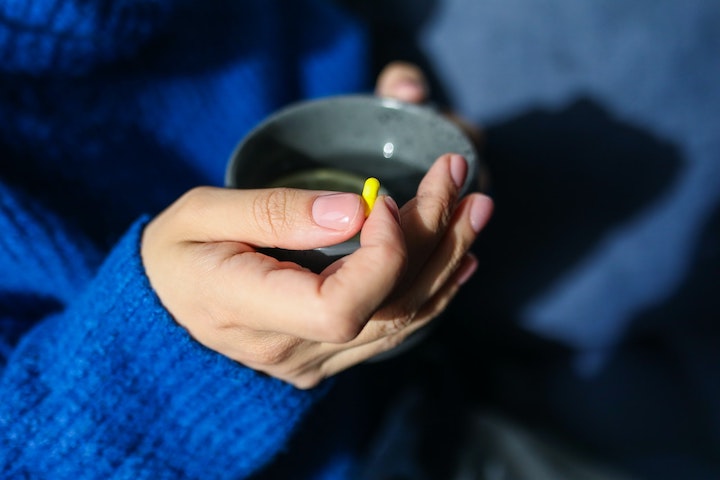Fentanyl is a medical drug used for pain relief. It’s often used in hospitals during procedures, and prescribed by doctors for aches and chronic pain.
So how has this drug become the topic of regular tragedy in recent news?

Like all opioids, Fentanyl is derived from the opium poppy, and is being increasingly illicitly manufactured.
The drug is then cut into other drugs like cocaine, heroin and methamphetamine.
100 times stronger than morphine, this opioid has a high potential for addiction, and is increasingly used recreationally.[1]
This has made street drugs even more addictive, more powerful, and more dangerous.[2]

Prescription Fentanyl is sold under a few different brand names:

Opioids, or narcotics, are medicines that treat severe pain, like headaches, backaches and injuries.
There is an increasingly high risk of becoming addicted if you take Fentanyl for an extended period of time.[4]

As well as numbing pain, Fentanyl can produce effects such as euphoria and relaxation.[5]
Recreationally, Fentanyl can also be consumed by being:
Any form of Fentanyl has the potential to become addictive if used regularly.

Common behavioural symptoms of addiction include:

Fentanyl depresses the central nervous system (CNS) and respiratory function, which can lead to physical symptoms.
The side effects of Fentanyl and Fentanyl abuse include:
The NHS recommends calling 111 if you experience unexplained stiff muscles, dizziness or fatigue while taking Fentanyl.

Fentanyl produces strong analgesic responses through binding and activation of opioid receptors.[9]
Fentanyl has shown in research to cause neuroadaptive changes in the brain.[10]
Neuroadaptation is where the body adjusts to the presence of a drug, which can lead to dependence.
Fentanyl dependence is when the brain can no longer function normally without it.

Fentanyl is highly addictive because it’s so potent.
Once your brain has become accustomed to Fentanyl, this can also make it hard for you to get pleasure from anything else, leading to opioid use disorder.
Whether you’re taking a prescription drug or using Fentanyl as an illegal high, you can quickly develop Fentanyl withdrawal symptoms when you stop.[11]
Yes, all opioids have the potential to cause physical dependence.
A physical dependence, unlike a behavioural addiction, is when your brain fails to function normally when the substance is taken away.
This is because opioids like Fentanyl change your brain chemistry.
A study identifying early risk factors for addiction later in life found that the following markers make you more likely to go on to develop addiction:
If you tick the boxes for any of these risk factors, you may be more susceptible to getting addicted to Fentanyl.

Fentanyl withdrawal can cause:

Substance use disorder is an technical term for drug abuse, dependence, and addiction.
The Diagnostic and Statistical Manual of Mental Disorders from the American Psychiatric Association can help you determine if your Fentanyl use is a problem.
The DSM defines substance use disorder as:
If you spot any of these Fenyanyl addiction signs, it’s important to get help sooner rather than later, as your dependence can worsen.

Opioid abuse increases your chances of risk factors like falls and injuries.
It also affects the endocrine system (the body’s network of glands and organs).
This can cause:

Opioid use disorders can begin to break down personal relationships.
Addiction can cause:

Your job prospects could be disrupted by:

It is possible to get clean and recover from Fentanyl addiction treatment.
Talking therapies, behavioural therapies, group therapy and addiction counselling can greatly boost your chances of a successful recovery.
Fentanyl is a substance that causes physical changes in the brain. This can lead to dependence, which means medication may be necessary for you to withdraw.
Fentanyl detox is about withdrawing from the substance and giving your brain and body the chance to acclimatise to life without it.
For a physical addiction like Fentanyl, a medical detox may be necessary.
This means you’ll be prescribed medication to help you alleviate the withdrawal symptoms.

Charities that can help you with Fentanyl addiction include:
If you’re taking a Fentanyl prescribed by a doctor, ensure you follow the prescription, and don’t increase your dose without medical advice.
Be honest with your doctor about your symptoms – this will allow your doctor to prescribe the correct dosage and reduce the chance of dependence.
If you have been using Fentanyl recreationally as a high, ensure you know the risks. Charities such as Talk To Frank can provide more information about Fentanyl.
If you’re using a different type of drug such as cocaine or heroin and you’re concerned about this being mixed with Fentanyl, Fentanyl test strips can help you detect whether your drug contains any Fentanyl.

Fentanyl is among the most common drugs involved in overdose deaths,[16] and has become a primary driver for the recent opioid crisis in the US.
Even in small doses, Fentanyl it can be deadly. Statistics by the Centers for Disease Control and Prevention report that over 150 people die every day from overdoses related to synthetic opioids such as Fentanyl.[17]
EEG tests which measure the brain revealed Fentanyl stops people’s breathing before other noticeable changes, and this can result in a loss of consciousness.
This explains why Fentanyl is so deadly.[18]

These signs could be caused by Fentanyl overdose, and require medical attention:

Overdose carries serious health risks, and requires medical intervention.
Naloxone is a medication that can prevent the death of someone who has taken a deathly dose of Fentanyl.[20]
Change Grow Live advise how to save someone’s life with Naloxone:

It’s important to get professional treatment soon as possible, because addictions become worse over time.
The following organisations and charities are completely free and available for everyone:

Inpatient Fentanyl rehab is where you temporarily live at a rehab facility – eating and sleeping there.
This is a secure unit where you’ll have 24/7 support to ensure you have the best chances success in your recovery journey.
 With outpatient treatment, you’ll continue to live at home, but travel into local treatment centres for regular care.
With outpatient treatment, you’ll continue to live at home, but travel into local treatment centres for regular care.
This may suit you if you have children, work or any other commitments you need to keep.
Rehab 4 Addiction can also offer support and rehab referrals.
When you call our helpline, you’ll be speaking to a someone who is in recovery and understands what you need to take the first step and begin your recovery process.
For more information about rehab for Fentanyl addiction, simply reach out to our 24/7, confidential hotline on 0800 140 4690.
[2] https://www.cdc.gov/stopoverdose/fentanyl/index.html
[3] https://www.dea.gov/sites/default/files/drug_chem_info/fentanyl.pdf
[4] https://www.asahq.org/madeforthismoment/pain-management/opioid-treatment/what-are-opioids/
[5] https://www.dea.gov/factsheets/fentanyl
[8] https://www.nhs.uk/medicines/fentanyl/side-effects-of-fentanyl/
[10] https://www.ncbi.nlm.nih.gov/pmc/articles/PMC9107910/
[11] https://nida.nih.gov/publications/drugfacts/fentanyl
[13] https://drugfree.org/article/substance-use-disorder-vs-addiction/
[16] https://www.cdc.gov/mmwr/volumes/69/wr/mm6911a4.htm?s_cid=mm6911a4_w
[17] https://www.cdc.gov/nchs/nvss/vsrr/drug-overdose-data.htm
[18] https://www.massgeneral.org/news/press-release/study-reveals-fentanyl-effects-on-brain
[19] https://www.changegrowlive.org/advice-info/alcohol-drugs/fentanyl-harm-reduction
[20] https://jamanetwork.com/journals/jama/fullarticle/2799344
[21] https://www.changegrowlive.org/advice-info/alcohol-drugs/fentanyl-harm-reduction